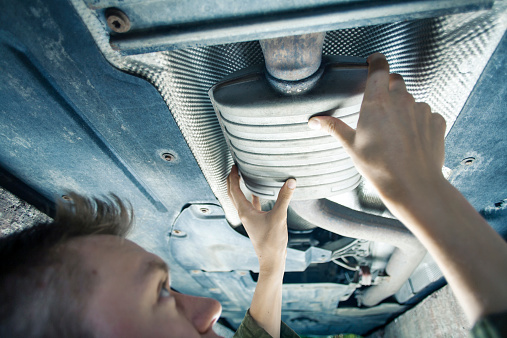December 15, 2024
Does A Broken Exhaust Affect Power?
If your car’s performance has deteriorated, especially in the engine department, there could be something wrong with your exhaust system. A leak or crack in your exhaust pipes might necessitate exhaust repair immediately.
What Is an Exhaust System?
An exhaust system is a crucial component of a vehicle’s engine that directs and manages the flow of gases produced during the combustion process. Its primary purpose is to expel harmful exhaust gases from the engine, reduce emissions, and minimize noise. It also helps improve engine efficiency. Here are the key parts of an exhaust system:
1. Exhaust Manifold
The exhaust manifold collects the exhaust gases from the engine cylinders and channels them into the rest of the exhaust system. It is typically made of cast iron or steel and is bolted to the engine block.
2. Oxygen Sensors
Oxygen sensors monitor the level of oxygen in the exhaust gases. These sensors provide critical data to the engine control unit (ECU) to adjust the air-fuel mixture for optimal combustion, improving performance and emissions.
3. Catalytic Converter
The catalytic converter is a device that reduces harmful emissions by converting toxic gases (such as carbon monoxide, nitrogen oxides, and hydrocarbons) into less harmful substances like carbon dioxide and water. It uses a catalyst, usually made of platinum, palladium, and rhodium, to facilitate these chemical reactions.
4. Muffler
The muffler reduces the noise created by the engine’s exhaust gases. It contains sound-dampening materials or chambers that absorb sound waves, quieting the engine’s operation.
5. Exhaust Pipes
Exhaust pipes carry the gases from the exhaust manifold through the rest of the system and out of the vehicle. These pipes are usually made of stainless steel to resist corrosion and high temperatures.
6. Resonator
A resonator is often found between the muffler and the exhaust pipes. It further reduces noise and modifies the sound frequency, making the exhaust tone smoother and more pleasant.
7. Tailpipe
The tailpipe is the final part of the exhaust system, where exhaust gases exit the vehicle. It directs the gases away from the vehicle to prevent them from entering the cabin.
Key Functions of the Exhaust System:
- Emission Control: Reduces harmful emissions to comply with environmental regulations.
- Noise Reduction: Minimizes engine noise through the muffler and resonator.
- Engine Efficiency: Improves engine performance by allowing gases to exit the engine efficiently.
- Safety: Directs harmful gases, such as carbon monoxide, away from the passenger cabin.
Overall, the exhaust system plays a vital role in maintaining vehicle performance, ensuring safety, and reducing the environmental impact of the vehicle.
How Do Exhaust Problems Affect a Vehicle’s Performance?
Exhaust defects can affect a vehicle’s performance in several ways. Some of the most significant ways include:
Poor or Uneven Gas Mileage
One of the most common problems with exhaust systems is poor gas mileage. An exhaust system not working properly can affect how much air gets into your engine and how much fuel it uses to run. If you notice that your vehicle is getting poor gas mileage, it may be time to get exhaust repair as this could cause the problem.
If your car has been running poorly recently, you should have it checked by a mechanic as soon as possible. The sooner you have these issues taken care of, the less money it will cost you in repairs and maintenance later on down the road!
Damage to Other Vehicle Components
Exhaust problems can affect a vehicle’s performance in several ways, but one of the most common is damage to other unrelated vehicle components. For example, if your catalytic converter is damaged, it can lead to a hole in your muffler. If this happens, gases may escape through the hole and cause damage to other components like the fuel lines or fuel tank.
Poor Acceleration
Your vehicle’s engine produces power by burning fuel and air, creating a combustion reaction. The exhaust system then expels the remaining exhaust gases from the engine, which helps keep it cool and prevents overheating.
A clogged or faulty exhaust system means you’re not getting rid of all those gases, which means they have nowhere to go except into your vehicle’s engine compartment. Without exhaust repair, these faulty components can cause overheating and other problems.
Increased Emissions
Exhaust problems can have a dramatic effect on your vehicle’s performance. One of the most common symptoms of an exhaust problem is a decrease in power. This is because when an engine is running, it needs to expel waste gases from the combustion process. When these exhaust fumes are not expelled properly, they will be forced into the intake system or even directly into the engine itself. This causes a buildup of carbon deposits and other contaminants that clog up vital parts of the engine and reduce its ability to run smoothly.
Increased Vibrations from Improper Mufflers
Exhaust problems can cause vibrations in your vehicle. The muffler is designed to absorb the sound of the exhaust and make it less loud, so if there are any cracks or holes in the muffler, it will not be able to properly absorb all of this sound. This can cause vibrations that you feel throughout the vehicle.
Rough Idling
Rough idling is one of the most common symptoms of a vehicle with an exhaust problem. Your car’s engine will rev up and down instead of running smoothly, and you may hear a rattling or clicking sound when it does so.
It’s important to note that other issues, such as a dirty air filter or clogged fuel injectors, can also cause rough idling.


